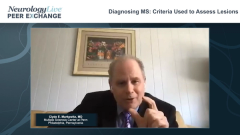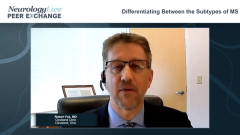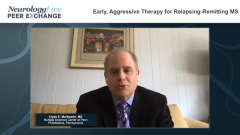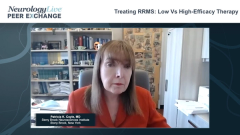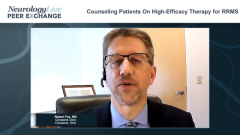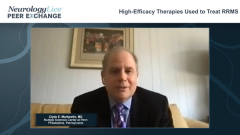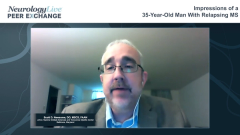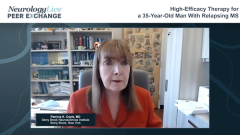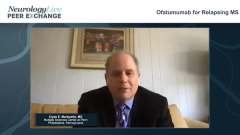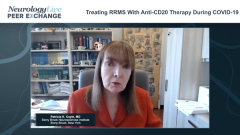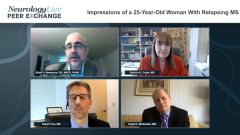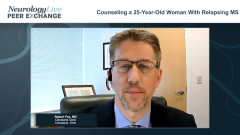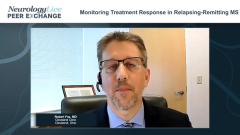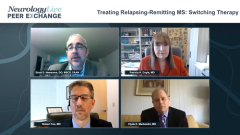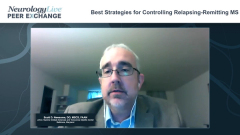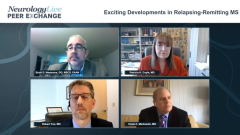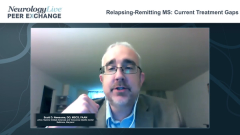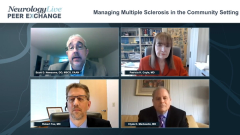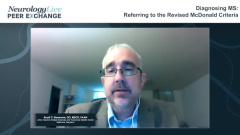
Managing Multiple Sclerosis in the Community Setting
Advice to community physicians and neurologists who play a role in caring for patients with multiple sclerosis in community practices on optimizing therapy with high-efficacy and newer treatment options.
Episodes in this series

Scott D. Newsome, DO, MSCS, FAAN: To round this out, Bob, what are your words of wisdom to community practitioners, whether they are neurologists or other health care providers who may be involved in the care of our patients with MS [multiple sclerosis]? What are things you would say to them?
Robert Fox, MD: I would say 3 things. The first is that MS is a treatable condition. We have good treatments, and we have spent a lot of time here today reviewing how to consider therapies, how to monitor therapies, and how to change therapies. Secondly, there are a lot of symptoms that can be left after the active inflammation has been stopped. Pat touched on that briefly here: there are many symptoms that can be improved. In fact, there are few symptoms that result from MS for which we are unable to do anything, so there is a lot of symptom management that we can do.
There are a lot of lifestyle changes as well. Pat was alluding to many of them, and I have had patients say to me, “Doctor, what diet should I follow with MS?” I will say, “There is some evidence about that. I am glad that you are asking about it, but what is more important is that you stop smoking because that is what is going to have a really negative impact on your MS.” Lifestyle changes can include smoking cessation, exercising, and healthy eating. The Mediterranean diet is the best diet as far as we can tell, but combining that with lifestyle management for a patient’s MS is also important.
Scott D. Newsome, DO, MSCS, FAAN: Clyde, the same question: what do you relay to the community health care practitioners or a primary care doctor who may be cotreating or trying to help a common patient?
Clyde E. Markowitz, MD: There are a couple pieces to this. First, for a community neurologist who may not be specializing in MS, it is important to let them know that the field has changed since they were in training because I still see people who are thinking about the disease-modifying therapies as the injectable therapies that you go to, and then you see how they do. That needs to shift in the field. Most of us who are practicing in big MS programs understand that issue. We have been doing studies for years now, so we understand where that is, but we have to get that out to most community neurologists so that they understand that we think of the disease differently now. There are more risks, there is more monitoring, and if they are not comfortable with that to start with, they need to refer the patient, and we will be able to take care of that and make the recommendations about how to monitor somebody on these therapies. That is important, and it is a shift in the way of thinking and the way we train people. All our residents these days are aware of that shift, and we have been able to impart that, but there are a lot of community neurologists out there who are still not in that game. We have to get that out there. Hopefully they will watch this program.
Scott D. Newsome, DO, MSCS, FAAN: So they should phone a friend?
Clyde E. Markowitz, MD: Yes, phone a friend. That is right.
Scott D. Newsome, DO, MSCS, FAAN: This is critical because that window of opportunity is there, and you do not want to miss that window. I am frustrated when patients come to us years later and are already using an assist device, or they are wheelchair bound. It is not that you cannot help that individual because you can work on their symptomatic care and their rehabilitation needs, but from a disease-modifying therapy perspective, the horse is already out of the barn in that situation, at least with our current therapeutics.
Clyde E. Markowitz, MD: Absolutely.
Scott D. Newsome, DO, MSCS, FAAN: What about you, Pat? What are your words of wisdom to the community? What are your top 2 or 3, even if they are similar to what was said?
Patricia K. Coyle, MD: Looking at all the developments in MS, it is impossible for somebody to keep up with them unless they have a vested interest in MS and see a large number of patients. We are setting a high bar. I am now telling patients that our expectation is that they are going to be able to lead a normal life. We cannot allow them to be cheated, so there is a responsibility for those who are not experts to partner with an MS center or an individual who is more knowledgeable of MS. Use them to help guide the initial early stages of diagnosis and initiation of the original disease-modifying therapy. Those are probably 2 of the most important things that are going to happen that can set the individual on the right pathway. You must partner with those with MS expertise. You owe that to your patients for them to do as well as possible, so I would emphasize that very strongly.
Scott D. Newsome, DO, MSCS, FAAN: I totally agree, and this is where the workforce of the future is so critical in training new people to get out there because we know that the majority of MS is outside of the big centers. That is where it is being treated, so we need to populate more regions of not just the United States but abroad as well.
This has been fantastic. I love doing webinars with colleagues, and I love poking fun at some of you guys. It is all in fun as you know, except for Clyde. Thank you.
Thank you for watching this NeurologyLive® Peer Exchange. If you enjoyed the content, which I hope you did, please subscribe to our e-newsletters to receive up-and-coming Peer Exchanges and other great content right in your inbox.
Transcript Edited for Clarity
Newsletter
Keep your finger on the pulse of neurology—subscribe to NeurologyLive for expert interviews, new data, and breakthrough treatment updates.

